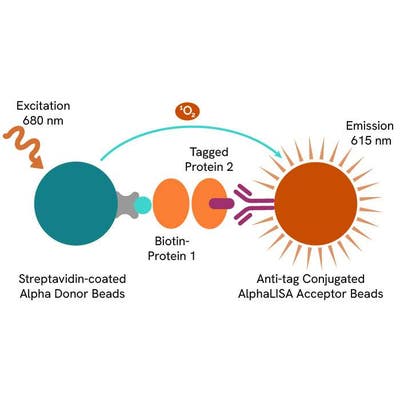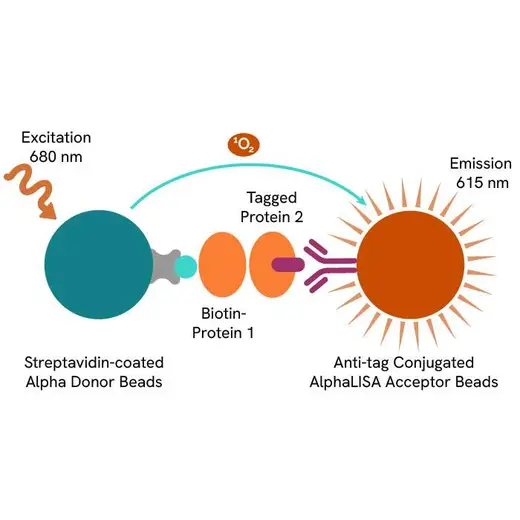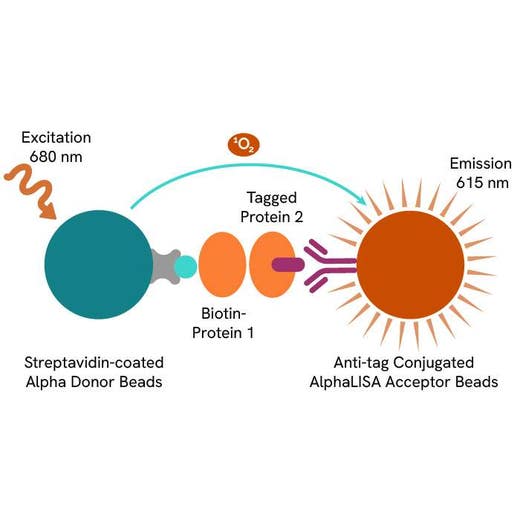
AlphaLISA Human FCGR3A/CD16a (176Val/V158) Binding Kit, 100 Assay Points


AlphaLISA Human FCGR3A/CD16a (176Val/V158) Binding Kit, 100 Assay Points






This kit is designed for the detection of binding activity between human FCGR3A (176Val) and human IgG Fc fragment using a homogeneous AlphaLISA™ assay (no wash steps). This assay can facilitate the design and development of antibody therapetics by using competitive binding.
| Feature | Specification |
|---|---|
| Application | Protein-Protein Interaction |
| Sample Volume | 10 µL |
This kit is designed for the detection of binding activity between human FCGR3A (176Val) and human IgG Fc fragment using a homogeneous AlphaLISA™ assay (no wash steps). This assay can facilitate the design and development of antibody therapetics by using competitive binding.



AlphaLISA Human FCGR3A/CD16a (176Val/V158) Binding Kit, 100 Assay Points



AlphaLISA Human FCGR3A/CD16a (176Val/V158) Binding Kit, 100 Assay Points



Product information
Overview
This kit is designed for the detection of binding activity between human FCGR3A (176Val) and human IgG Fc fragment using a homogeneous AlphaLISA™ assay (no wash steps). This assay can facilitate the design and development of antibody therapetics by using competitive binding.
Features:
- No-wash steps, no separation steps
- Ease-of-use: few addition steps, fast assay development
- Broad range of affinities: detect strong or weak interactions, from pM to mM affinity
- Distance: measure very large protein or antibody complexes – spanning up to 200 nm or more
- High avidity: multiple binding sites on each bead enables use of nanomolar concentrations of antibodies or proteins, as well as use of low affinity binders
These kits use IgG Fc AlphaLISA™ Acceptor beads and Streptavidin-coated Donor beads to capture biotinylated human FCGR3A in a competition assay. Donor beads and Acceptor beads come into proximity through IgG Fc fragment binding to FCGR3A. Excitation of the Donor beads provokes the release of singlet oxygen that triggers a cascade of energy transfer reactions in the Acceptor beads, resulting in a sharp peak of light emission at 615 nm.
The Fc-Gamma Receptors (FCGRs) are members of immunoglobulin superfamily and play a critical role in the function of therapeutic antibodies. FCGRs are divided into three classes and FCGR3 (CD16) is expressed as two distinct forms (FCGR3A and FCGR3B) encoded by two different highly homologous genes in a cell type specific manner. FCGR3A is a low/intermediate affinity receptor for polyvalent immune-complexed IgG. It is involved in phagocytosis, secretion of enzymes and inflammatory mediators, antibody-dependent cellular cytotoxicity (ADCC), mast cell degranulation and clearance of immune complexes. In humans, a single nucleotide polymorphism creates two isoforms: high binding (176Val/V158) and low binding (176Phe/F158) forms that, when homozygous, may influence susceptibility to autoimmune diseases or response to therapeutic IgG antibodies. FCGR3A has been considered as an important therapeutic target. This AlphaLISA assay can be used to determine the binding activity of human IgG Fc fragment to human FCGR3A and also can be used to study how other antibodies bind to FCGR3A by competition assay.
Specifications
| Application |
Protein-Protein Interaction
|
|---|---|
| Automation Compatible |
Yes
|
| Brand |
AlphaLISA
|
| Detection Modality |
Alpha
|
| Product Group |
Kit
|
| Sample Volume |
10 µL
|
| Shipping Conditions |
Shipped in Blue Ice
|
| Target |
FCGR3A
|
| Target Class |
Binding Assay
|
| Target Species |
Human
|
| Technology |
Alpha
|
| Unit Size |
100 Assay Points
|
Video gallery

AlphaLISA Human FCGR3A/CD16a (176Val/V158) Binding Kit, 100 Assay Points

AlphaLISA Human FCGR3A/CD16a (176Val/V158) Binding Kit, 100 Assay Points

Resources
Are you looking for resources, click on the resource type to explore further.
Advance your autoimmune disease research and benefit from Revvity broad offering of reagent technologies
Loading...


How can we help you?
We are here to answer your questions.






























